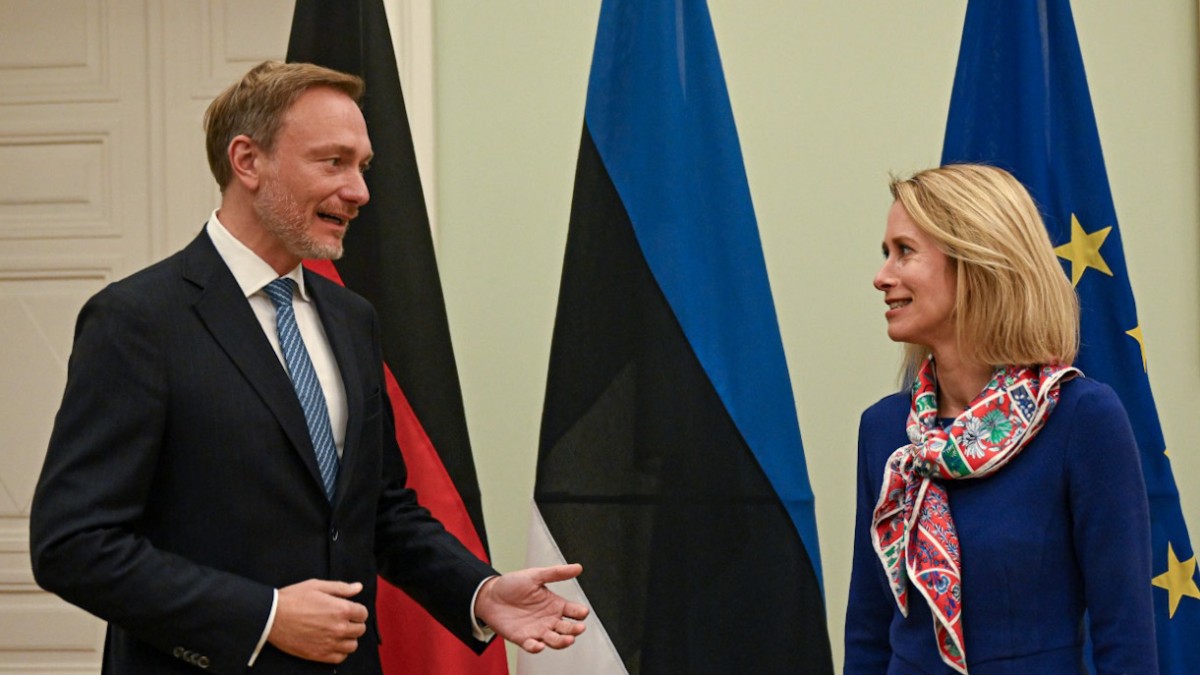Christian Lindner would now like to see what they have built for him, here at the military training area in Rukla, Lithuania. “Let’s start with the self-propelled howitzer?” he asks Colonel Klaus-Peter Berger, who is in command here. The FDP Federal Finance Minister traveled to the Baltics this week; two days, three countries: Latvia and Estonia on Thursday, Lithuania on Friday, and he really enjoyed pretty much everything that Lindner saw and heard on this trip.
In Riga, six young start-up entrepreneurs explained to him in the stucco-decorated conference room of the German embassy how important the attractive Estonian tax regulations with regard to employee equity participation were for them. A thing that Lindner has been trying to convince his coalition partners back home in Berlin for a long time – but the Bundestag has not yet passed its future financing law. In Tallinn, he particularly likes the three-minute tax return, which has been standard in the digitalized country for years.
An entire German brigade will soon be permanently stationed in Lithuania
And then there are the bilateral talks with his respective counterparts, after which Lindner and his hosts always agree that the debt rules in the EU should be reformed, but by no means tightened. The minister can rarely enjoy so much harmony at home, in his traffic light coalition with the SPD and the Greens.
And now he is in Rukla, where around 850 German soldiers are stationed, most of them as part of the “Enhanced Forward Presence Battlegroup”. The multinational battle group has been securing the eastern flank of NATO territory for several years. And soon an entire German brigade, around 4,000 soldiers, will be permanently stationed in Lithuania. Defense Minister Boris Pistorius (SPD) has already announced the schedule, and details will follow in December, such as remuneration or accommodation.
To understand what significance the presence of NATO troops has had for the people here since Russia’s attack on Ukraine, just take a short walk through the capitals of the three Baltic states. Ukrainian flags can be seen everywhere, in front of public buildings as well as in souvenir shops.
The German soldiers, Colonel Berger tells Lindner in Rukla, are also “little ambassadors” here. You are highly valued by the local people. What Germany is making here is a substantial contribution towards credible deterrence to the East.
Lindner is committed to the two percent target – at least
Lindner now has the self-propelled howitzer 2000 reached out and asked the soldiers present what they did in their free time and whether the sports opportunities were sufficient. He answers that you are well looked after. “No wish list? A relief,” jokes Lindner. Here, too, he is used to something different from home, where he had to fend off billion-dollar demands from his cabinet colleagues during budget negotiations for months.
Of course, it’s still about money during Lindner’s trip through the Baltics. In Estonia, the finance minister there emphasizes that his country spends 3.2 percent of its economic output on defense, while in Lithuania it is 2.7 percent. During his appearances on Thursday and Friday, Lindner can at least say that Germany will now permanently meet NATO’s two percent target. But of course the Finance Minister knows that this will not be easy. Because once the 100 billion euro special fund for the Bundeswehr is used up, the additional billions will have to be raised from the normal budget. Also for the planned brigade in Lithuania.
Lindner is now there Leopard 2 arrived, the main battle tank that Germany only delivered to Ukraine after long and tough debates. The minister asks the four soldiers who are part of the crew about their careers. He studied computer science, says one of them. Lindner is impressed. There are certainly civilian career alternatives, he says. “But only a few who offer me this working environment,” the soldier replies with great seriousness.
At the end, after Lindner has looked through the telescope of a sniper rifle, Lieutenant Colonel Andreas Kirchner, commander of the EFP battle group, declares the “static weapons show” to be over. The minister thanks him for making all of this possible for his visit; it always takes a certain amount of effort. “But since you, as Federal Minister of Finance, will soon be able to make a lot possible for us, that was the least of our problems,” replied the lieutenant colonel. Amid the general merriment, Lindner quickly assured that he would always be open to the armed forces’ concerns. And they had already organized “a little bit of money”.
2023-11-03 17:16:10
#Linder #Baltics #bit #money

